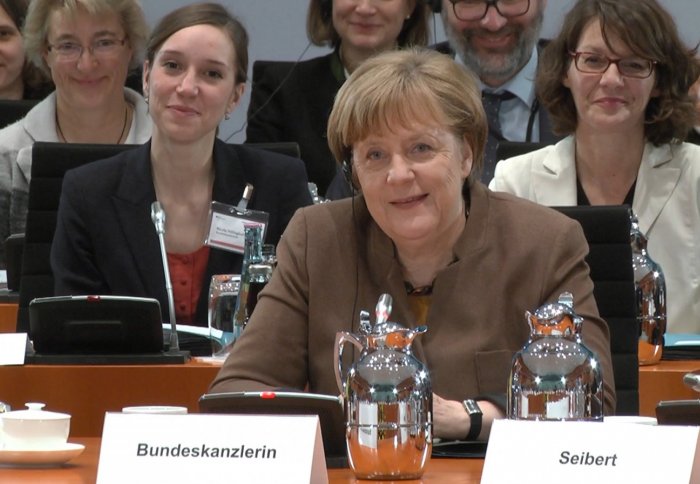Angela Merkel discusses global antibiotic challenge with Imperial academic

The German Chancellor exchanged perspectives on antimicrobial resistance with Imperial's Professor Alison Holmes.
Professor Alison Holmes joined Chancellor Angela Merkel and a select group of health experts at the Third International German Forum this week.
The Forum, held at the Federal Chancellery in Berlin this Tuesday and Wednesday, brought together experts from 25 countries to debate global challenges surrounding the future of human health as part of Germany’s G20 presidency.
The importance of antimicrobial resistance is underestimated.
– Angela Merkel
Chancellor of Germany
Chancellor Merkel used the event to emphasise the critical importance of global health, especially the 2030 Agenda for Sustainable Development, where the international community set "the extremely ambitious goal of giving every person in the world, whatever their age, an entitlement to health care."
A focal point of the Forum was the challenge of antimicrobial resistance (AMR). The excess, inappropriate use of antibiotics is causing them to lose their effectiveness. Bacteria are becoming increasingly resistant, leading to prolonged illness, higher fatality rates and a greater burden on healthcare systems around the world. AMR is responsible for 25,000 deaths per year in Europe, and 700,000 around the world.
 Professor Holmes leads Imperial’s Antimicrobial Research Collaborative (ARC@Imperial), which brings together more than 100 academic experts from across the College, to address this global threat synergistically. She also serves as Director of the NIHR Health Protection Research Unit in Healthcare Associated Infections and AMR at Imperial.
Professor Holmes leads Imperial’s Antimicrobial Research Collaborative (ARC@Imperial), which brings together more than 100 academic experts from across the College, to address this global threat synergistically. She also serves as Director of the NIHR Health Protection Research Unit in Healthcare Associated Infections and AMR at Imperial.
At the Forum as Professor Holmes was introduced, Chancellor Merkel said: “The importance of antimicrobial resistance is underestimated. It has an impact on livestock and humans alike, and these challenges should be considered together. We have problems including the over-prescription of antibiotics and the urgent need to develop new ones. We must be careful and we should treasure what antibiotic treatments we already have.”
Changing behaviour
Professor Holmes was invited to discuss behavioural change and emphasised the “essential role of human behaviour in addressing the challenge of antibiotic resistance locally and globally.” This is “not only about restricting antibiotics but also optimising their use… behaviour is important because the consequences of AMR are so enormous and far-reaching.”
 She noted that while it is “good to see new research into new treatments and new antibiotics”, buying some time as older antibiotics lose their potency, “behaviour and usage is key”.
She noted that while it is “good to see new research into new treatments and new antibiotics”, buying some time as older antibiotics lose their potency, “behaviour and usage is key”.
“In Europe, 35% of our hospital patients are on antibiotics,” but many of those come from unnecessary prescriptions.
This is not just about changing the behaviour of the public, but healthcare experts and professionals too, argued Professor Holmes. “In our hospitals, even when there’s great expertise and policies, we can be limited by a lack of strategic input and limited governance structures… There’s been much talk about public engagement, but I want to stress that we in healthcare must get our own house in order.”

The Federal Chancellery in Berlin
We have an “enormous opportunity to use technology intelligently to improve behaviour on antibiotics… we can use surveillance, apps, integrated data at the point of care, decision support systems, artificial intelligence, data visualisation, the power of social media, online media and gamification” to achieve behavioural change.
Professor Holmes added, “we need to fundamentally develop a new relationship with antibiotics to protect them as a precious resource for all of society.”
Chancellor Merkel and Professor Holmes exchanged perspectives on the patient experience and ways on changing behaviour to reduce overprescription. Professor Holmes highlighted the practice of “issuing delayed prescriptions in primary care, using opportunities to educate… and engagement with other specialties of medicine, particularly in areas where there’s intense use of antibiotics.”
The full event can be viewed at the German International Forum.
Article text (excluding photos or graphics) © Imperial College London.
Photos and graphics subject to third party copyright used with permission or © Imperial College London.
Reporter
Andrew Scheuber
Communications Division